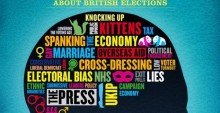The stereotypical picture of local councils is that they are dominated by men, those the wrong side of fifty and the retired: “male, pale and stale”, as they are often dismissed.
In this case, it turns out the stereotype is perfectly accurate: around three-quarters of local councillors are male; 96 per cent are white; and they have an average age of fifty-eight, with more than a quarter aged over sixty-five.
Why do voters keep voting for such an unrepresentative bunch? To answer this, imagine an election where the voters turned nasty and voted out of office every incumbent and replaced them with rival candidates standing in their first election. How different would the newly elected councillors be?
The answer is: not much.
The data shows that if every incumbent was replaced, then a few more women might be elected; the proportion of women councillors would rise from the current 28 per cent to 32 per cent. Similarly, a few more people from among minority ethnic groups might get elected but they would still be substantially under-represented – just over 5 per cent of new candidates are from minority groups, who make up 14 per cent of the population in England and Wales.
Although local parties are doing better than Westminster in attracting women they are as bad or worse at recruiting ethnic minority candidates and councillors.
And would our electoral revolution breathe fresh life into local government by bringing in a wave of energetic young newcomers? To some extent. The average age of incumbent councillors is fifty-eight, but the average new challenger, at forty-eight, is no spring chicken either. Even if every incumbent was voted out, one in seven councillors would be past the age of retirement and four in ten above fifty-six years of age.
In short, little would change except that the proportion that have retired from work would reduce from around 42 per cent to around half that number. The reason voters keep voting for unrepresentative councillors in other words is because candidates are almost as unrepresentative as those they are challenging.
Candidates that are standing in their first election, just like current councillors, are typically university-educated professionals and managers. Very few are from manual occupations, a fact which appears to be missing from much of the discussion about under-representation, and given the relatively low level of remuneration available to councillors in the UK it is not surprising that it is largely the retired that have the time and commitment required to serve.
With challengers like these, local councils representing a fair cross-section of the places they govern look like a distant hope.
Surveys of local election candidates repeatedly show that candidates receive little support from employers after they make the decision to stand and in a sizeable proportion of cases there is a hostile reaction. Some enlightened countries have sabbaticals available to elected councillors, ensuring that once they have served their communities they can resume their careers. The UK does not.
The aftermath of our hypothetical election might be more interesting: many of these new councillors would presumably be somewhat surprised to find themselves elected; sacrificing employment opportunities (not to mention the unsought strain on personal and family relationships) for the councillor’s allowance would see mass resignations and a glut of by-elections.
This all paints a rather bleak picture of the current state of local government representation. With challengers like these, local councils representing a fair cross-section of the places they govern look like a distant, and forlorn, hope. We might expect, therefore, when offered an array of schemes to transform the profile of elected councillors that candidates would favour reform. Not a bit of it.
In the survey of local election candidates in 2006 two suggestions were floated: all women shortlists and party quotas for women candidates. About one in ten candidates approved of the idea of the shortlists but a third disapproved and a further third strongly disapproved. There was a little more warmth towards party quotas but even this idea was rejected by a clear majority.
Finally, when it became clear that national policy makers were giving serious thought about using ‘recall’ elections as a means of curbing recalcitrant MPs the 2013 survey floated this idea with local candidates. A clear majority, 58 per cent supported the principle of councillors being removed from office should a quarter of the local electorate petition for that. This might be the way to transform the composition of local councils. Now, who’s going to volunteer to organise a petition?
“Male, pale and stale (and likely to stay that way)” is published in full in Biteback Publishing’s Sex, Lies and the Ballot Box.
Michael Thrasher







